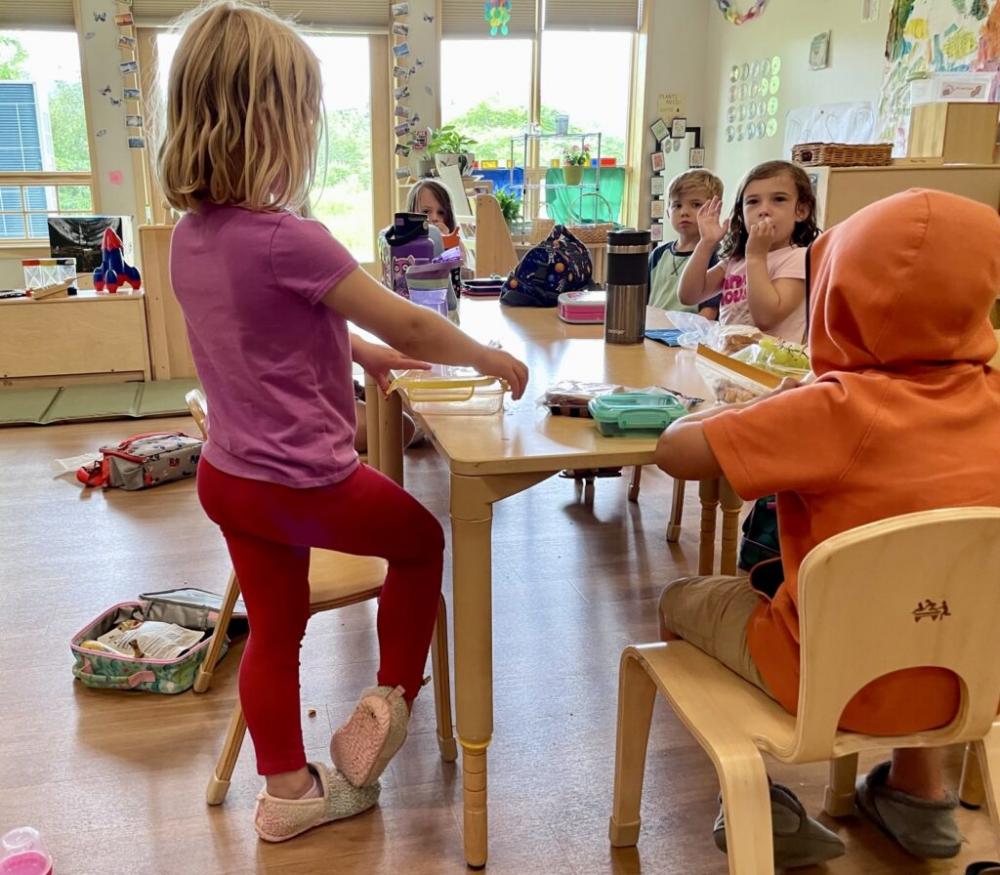
Little Antlers Learning Center in Plymouth is able to offer affordable child care with support from Mid-State Health Center, also in Plymouth. (Annmarie Timmins | New Hampshire Bulletin)
The state is investing nearly $6.75 million in federal money in two new initiatives to expand child care for parents and help employers become more aware and supportive of employees’ child care needs.
Both projects were inspired by the Department of Health and Human Services’ plan to expand affordable quality child care across the state. Other investments, which have included $116.8 million in federal pandemic assistance, have also focused on child care worker recruitment and retention and increasing infant and toddler care.
Employers in all industries, lawmakers, families, and advocacy groups have been unified in calling the child care shortage a crisis. In a recent analysis, the New Hampshire Fiscal Policy Institute said a shortage of affordable housing and child care are the biggest hurdles to the state’s economic growth. Approximately 16,800 adults were out of the labor force during the last year due to child care needs, the analysis said.
The crisis prompted the Legislature to include more than $50 million in the budget to enhance child care worker recruitment and expand eligibility for state child care subsidies.
One of DHHS’s new projects, approved by the Executive Council last week, awarded Granite United Way in Manchester $1.5 million to bring employers into the child care expansion effort, something the state has not done previously, said Karen Hebert, director of the DHHS Division of Economic Stability.
Granite United Way will survey employers and employees to identify family care needs, the support that exists now, and gaps that need addressing. The organization will also research what has worked elsewhere and launch five pilot projects.
One pilot will create a “family-friendly workplace” certification program, similar to those for companies that promote their workplace as welcoming to veterans or people in recovery.
Employers will learn what employees with families need and get a better sense of options to support them, such as paid parental leave, telecommuting, or the flexibility to leave work to pick up a sick child from child care or attend a school event.
Elsewhere, the certification has been promoted as a recruiting tool for employers. “It would give them certain bragging rights, if you will,” Hebert said.
The other four pilots will provide grants to employers and child care providers for projects that would expand child care access across the state.
“The idea behind it is to support equitable access for child care based on the community needs,” Hebert said. “So it’s really diving into the community, not just looking at things from a state perspective. Each community knows what it needs best.”
Hebert said the state Department of Business and Economic Affairs will work with Granite United Way and employers on that effort.
The Executive Council last week increased funding for a second of DHHS’ grant programs, from $3.5 million to $5.25 million, that’s aimed at helping the existing 724 child care programs stay open and encouraging the creation of as many as 50 new programs, some in rural areas.
Hebert said some of the money will go to child care providers for business “health assessments” to better understand what their needs are.
The program will include money providers can use for equipment, lead remediation, lease or mortgage costs, and drinking water testing and remediation, among other things. The state Department of Environmental Services released a report last week that said that 6 percent of the 3,468 water outlets, such as drinking fountains, tested for lead at child care programs were at or above the legal limit.
Grants will also be available to assist providers with improving business practices such as managing legal and tax affairs; insurance; marketing and outreach; and budgeting and financial management.
The money is available to child care centers as well as smaller family child care providers.
“They will go through this health assessment … to identify needs and (the companies overseeing the program for the department) will help them develop their own strategic plan,” Hebert said. Next, the companies will connect providers with the professionals who have the expertise they need.
Providers can get more information by visiting Child Care Aware of New Hampshire at nh-connections.org.
This story is courtesy of NH Bulletin under creative commons license. No changes have been made to the article.

 Current Issue - July 2024
Current Issue - July 2024